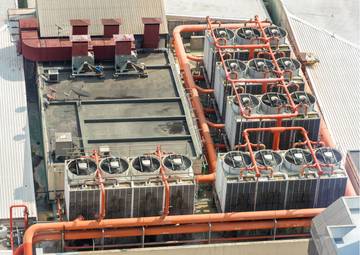Flammable refrigerants and fire safety in buildings
In early October 2023, the European Parliament and the Council reached an interim agreement that will lead to a concrete ban on the use of HFCs and HFOs, i.e. fluorinated refrigerants, and the complete phase-out of HFCs by 2050. What does this mean in practice? First and foremost, alarm bells are ringing among refrigeration and air conditioning specialists. Right behind them, building fire safety specialists are on the alert.
Ever since 2017, when the first version of EN 378 came into force in the Czech Republic, it has been clear that the field of refrigeration and air conditioning technology will have a greater impact on the fire safety of buildings than in previous years. The standard has taken the route of reducing the GWP, Global Warming Potential. What has been common to the refrigerants used in cooling systems, and therefore heat pumps, over the past nearly 50 years is that they have been, with a few exceptions, non-flammable. This characteristic was balanced by the fact that their environmental impact, as measured by the GWP index, was significant. However, this aspect has not been evaluated in the past decades. With the advent of EN 378, the relationship to GWP assessment has changed and it has become necessary to use low GWP substances in refrigeration systems. However, these refrigerants are more or less flammable. In view of the ever-increasing temperatures in the summer months and the search for new ways in ventilation and heating, cooling systems are increasingly used in buildings. It is therefore clear that flammable substances are being newly introduced into buildings, increasing the fire risk of the buildings. The next step, starting in October 2023, is a complete ban on fluorine-based refrigerants, i.e. a move away from mildly flammable refrigerants to flammable refrigerants. Refrigeration systems will revert to substances abandoned more than 50 years ago, namely propane, butane and ammonia. The actual cooling systems are not prepared by their technical parameters for this turnaround, the fire risk in the buildings will be increased by the volume of flammable refrigerants.
This issue is dealt with at the Faculty of Civil Engineering by Ing. Marie Rusinová, Ph.D. from the Institute of Civil Engineering, authorized person in the field of fire safety of buildings, and Ing. Marian Formánek, Ph.D. from the Institute of Technical Equipment of Buildings, specialist in the field of refrigeration and air conditioning technology. In cooperation with the Association of Refrigeration and Air-Conditioning Technology and interested companies in the field of refrigeration, these specialists presented the described issues and possible solutions within the XXXII International Conference Fire Protection 2023, organized by the University of Economics and Technology, in the section Climate Change and Fire Prevention on 6 September 2023. The implications of the advent of flammable refrigerants were further presented at the Fire Protection 202 Seminar event, organised annually by Seidl, Ltd. in Brno, this year on 3 and 4 October 2023. Ways are now being sought to further communicate the information and boundary conditions surrounding the use of flammable refrigerants in buildings to the professional public of "refrigeration" and "fire" professionals.
| Short link | https://www.fce.vutbr.cz/en/research/achievements/344 |
|---|---|
| Responsible person | Mgr. Almíra Pitronová |
| Published |
